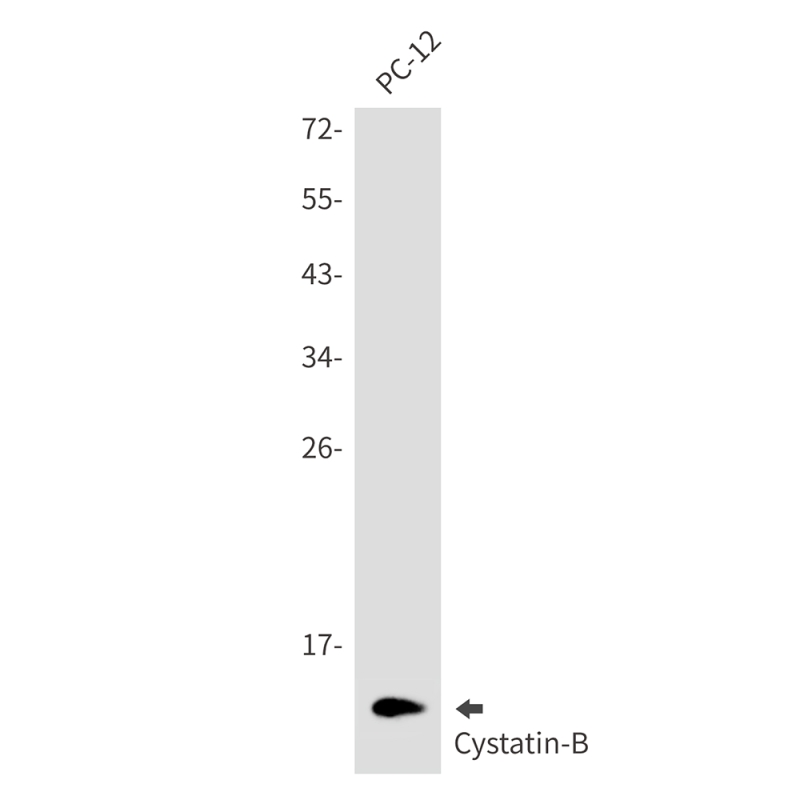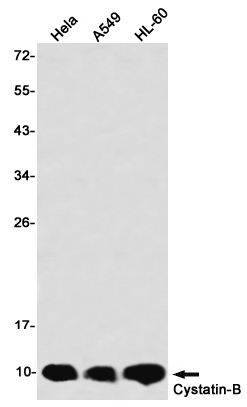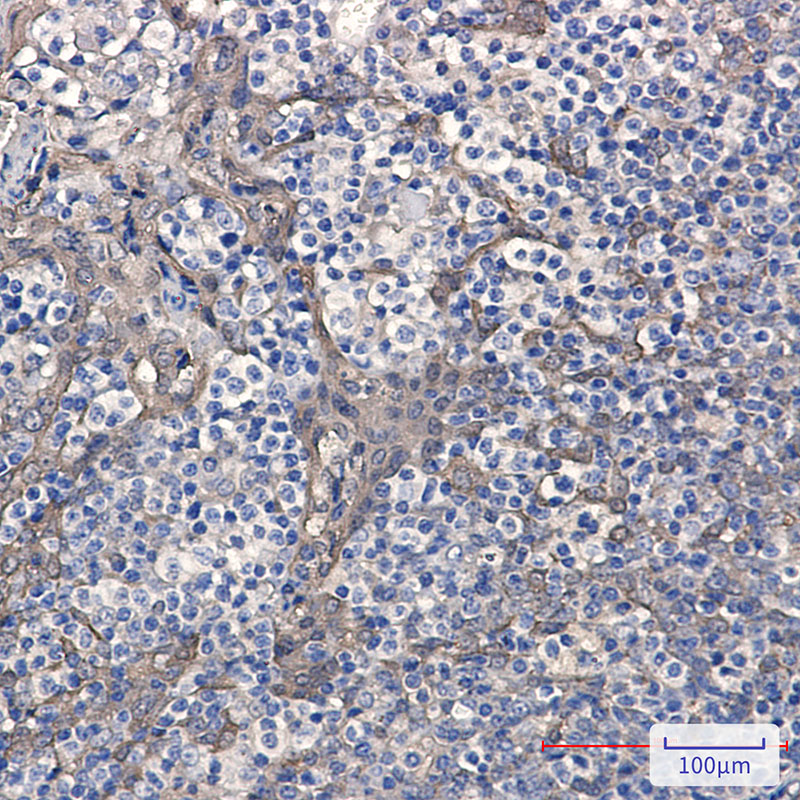


| WB | 1/500-1/1000 | Human,Mouse,Rat |
| IF | 咨询技术 | Human,Mouse,Rat |
| IHC | 1/50-1/100 | Human,Mouse,Rat |
| ICC | 技术咨询 | Human,Mouse,Rat |
| FCM | 咨询技术 | Human,Mouse,Rat |
| Elisa | 咨询技术 | Human,Mouse,Rat |
| Aliases | CSTB; CST6; STFB; Cystatin-B; CPI-B; Liver thiol proteinase inhibitor; Stefin-B |
| Entrez GeneID | 1476 |
| WB Predicted band size | Calculated MW: 11 kDa; Observed MW: 11 kDa |
| Host/Isotype | Rabbit IgG |
| Antibody Type | Primary antibody |
| Storage | Store at 4°C short term. Aliquot and store at -20°C long term. Avoid freeze/thaw cycles. |
| Species Reactivity | Human,Rat |
| Immunogen | A synthetic peptide of human Cystatin-B |
| Formulation | Purified antibody in TBS with 0.05% sodium azide,0.05%BSA and 50% glycerol. |
+ +
以下是3篇关于Cystatin B抗体的参考文献及其摘要概括:
1. **"Mutations in the gene encoding cystatin B in progressive myoclonus epilepsy (EPM1)"**
- **作者**: Pennacchio, L.A., et al.
- **摘要**: 该研究首次将Cystatin B基因突变与进行性肌阵挛性癫痫(EPM1)相关联。通过Western blot和免疫组织化学技术,使用特异性Cystatin B抗体检测患者细胞中蛋白表达水平降低,揭示了该蛋白缺失在疾病发生中的作用。
2. **"Cystatin B: A role in neurodegeneration in progressive myoclonus epilepsy"**
- **作者**: Rinne, R., et al.
- **摘要**: 研究利用Cystatin B抗体对EPM1患者脑组织进行免疫组化分析,发现神经元内异常蛋白聚集及溶酶体功能紊乱,提示Cystatin B缺失导致神经退行性病变的分子机制。
3. **"Altered intracellular localization of cystatin B in leukocytes from patients with EPM1"**
- **作者**: Alakurtti, K., et al.
- **摘要**: 通过免疫荧光和流式细胞术,使用Cystatin B抗体分析患者白细胞,发现该蛋白的亚细胞定位异常(如核内异位),为突变导致的功能障碍提供了细胞学证据。
4. **"Cystatin B-deficient mice exhibit neuronal loss and gliosis in the hippocampus"**
- **作者**: Joensuu, T., et al.
- **摘要**: 在Cystatin B基因敲除小鼠模型中,研究通过抗体介导的免疫印迹和免疫染色,证实海马区神经元丢失及胶质增生,支持其在神经保护中的关键作用。
这些文献均直接涉及Cystatin B抗体的应用,涵盖疾病机制、蛋白定位及功能验证等领域。
Cystatin B is a small, ubiquitously expressed protein belonging to the cystatin superfamily of cysteine protease inhibitors. It primarily regulates cathepsin activity (e.g., cathepsin B, L, S) by blocking their proteolytic functions, playing roles in cellular processes like apoptosis, inflammation, and protein turnover. Mutations in the *CSTB* gene encoding cystatin B are linked to progressive myoclonus epilepsy type 1 (EPM1/Unverricht-Lundborg disease), a neurodegenerative disorder characterized by seizures, myoclonus, and neuronal loss.
Cystatin B antibodies are essential tools for studying its expression, localization, and function in health and disease. These antibodies enable detection of cystatin B in tissues and cells via techniques like Western blot, immunohistochemistry (IHC), and immunofluorescence (IF). Research using these antibodies has revealed reduced cystatin B levels or mislocalization in EPM1 models, supporting its role in neuroprotection. Additionally, cystatin B is implicated in cancer, immune regulation, and lysosomal storage disorders, with antibodies aiding in exploring its involvement in tumor progression, immune cell activity, and lysosomal dysfunction.
Commercial cystatin B antibodies are typically raised in rabbits or mice against peptide antigens, validated for specificity and sensitivity. Their applications extend to diagnostic research, biomarker studies, and mechanistic investigations, highlighting cystatin B's multifaceted roles in cellular homeostasis and pathology.
×